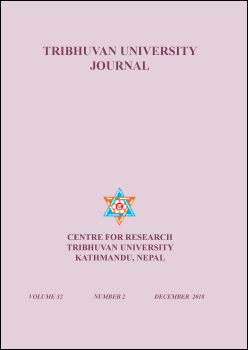Socio-Cultural Identity of Dalits in Karnali
DOI:
https://doi.org/10.3126/tuj.v32i2.24719Keywords:
Socio-cultural identity, indigenous knowledge, untouchable, participant, ethnicity, idea sharing, exclusion, disparitiesAbstract
This study primarily aims at analyzing the socio-cultural identity of Karnali Dalits and its impact on society, with an additional motive to examine why Karnali Dalits tend to cover up their caste identity. To address the research need, structured interviews, one-to-one interviews, focus group discussion, participant observation and home visits were used. Major findings include the existence of rich socio-cultural identity of Dalits, who suffer from inferiority complex due to acute caste-based discrimination against them, and who are extremely excluded politically, socially and economically. The study, therefore, suggests that the state and other stakeholders formulate a strategy to empower Karnali Dalits, who often tend to conceal their caste identity due to prevailing severe discrimination against them. After the political changes in Nepal, there are many positive discriminatory laws and opportunities, which are still untapped by the Dalit communities in comparison to other ethnic and disadvantaged section of the communities. The comparative study of Dalit to provide concrete solution to develop positive discriminatory plans and programs which could provide some relief to the Dalits to some extent. The study reaffirms that Kamis are rich in iron work and mechanics, while Sarkis are craft persons in leather work, with Damais being skilled in musician, dance and tailoring.
Downloads
Downloads
Published
How to Cite
Issue
Section
License
This license enables reusers to distribute, remix, adapt, and build upon the material in any medium or format for noncommercial purposes only, and only so long as attribution is given to the creator.
© Center for Research, Tribhuvan University

